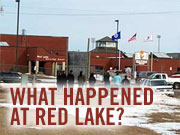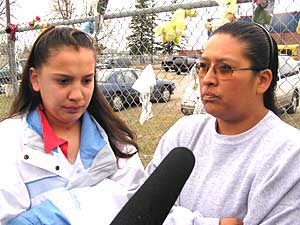Audio
Photos
More from MPR
| ||||||||||||||||||||||||||
Red Lake, Minn. — The Red Lake Tribal Council voted to distribute $5,000 checks to 15 families, including the family of Jeff Weise, 16, who killed nine people before killing himself. The decision doesn't sit well with Donna Lewis of Ponemah. Lewis is the mother of one of the shooting victims, Dewayne Lewis, 15.
"People are looking at that kid, Jeff Weise, like he's a victim," said Lewis. "He ain't no victim in this. He's the one that caused all of this. If he wanted something like this to go on, he should have did it amongst his own self, instead of taking innocent lives like this. I lost my son because of him."
Lewis' comments are a sharp contrast to what others have been saying publicly. Tribal and school officials have refrained from attacking Weise. Many have included him as part of the community's shared tragedy.
Lewis lashed out at Jeff Weise's family for not paying enough attention to the boy. Weise lost his father to suicide four years ago. His mother was in a car accident and now lives in a nursing home.
Tribal officials say they included a payment to the Weise family to help them with funeral and burial costs. Tribal secretary Judy Roy says she understands why some people are upset.
"We realize there are feelings of hurt and anger about this," said Roy. "And we realize that further distributions will probably need to be considered more fully, and that will happen."
Roy says it's unclear whether the Weise family will get further distributions from the memorial fund, which has received more than $200,000 in donations. The tribal council will create a community advisory group to establish guidelines for future payouts.
Roy says she hopes most tribal members will understand the need for compassion, even for Jeff Weise's family.
"Only the families of the loved ones who were killed know the full extent of the hurt and sorrow that this has caused their families," said Roy. "But I have not heard a lot within the larger community. I'm not soliciting opinion on it. We don't need anything else to further divide us."
|
A lot of Red Lake kids always put down Ponemah kids. ... Red Lake does look at us different. I don't know why, they think they're better than us.
- Brittaney Lewis, sister of shooting victim
|
Some divisions have been around a long time on the reservation. Historically, Ojibwe societies were built around clans of large, extended families. Those clans still exist, and there are sometimes tensions between those family groups.
There are also cultural divisions between communities. The remote village of Ponemah is isolated from the more populated areas of the reservation. While Christianity has flourished in larger towns like Red Lake, the people of Ponemah have held on to their spiritual ceremonies and cultural traditions.
Sometimes those cultures clash. When Ponemah resident Donna Lewis lost her son Dewayne in the shooting, she was disappointed to see a Christian symbol left in his memory at a roadside memorial in Red Lake.
"They put a cross out for my baby, and I came and took it down, because we didn't believe that way," Lewis said. "He didn't. He believed in the Ojibwe way, and that's the way we're staying."
Since the shootings, Donna's daughter has decided she doesn't want to go back to Red Lake High School. Brittaney Lewis got most of her education at the elementary school in Ponemah. She says when Ponemah kids transfer to the high school in Red Lake, they're sometimes picked on. She says they're sometimes called savages, or savvy for short.
"A lot of Red Lake kids always put down Ponemah kids," Lewis said. "And they were always, I don't know, just showing hate towards Ponemah. Maybe because they thought we were savvy or something like that. But we're just the same as them, and I don't know why they should have treated us any different."
Three of the five students who were killed in the shootings were from Ponemah. Brittaney Lewis says she's thought about that, and wonders why that is.
"When I came to this school a lot of people tried to hate on me and things like that," Brittaney Lewis said. "Most of the students that died in this were from Ponemah. And it just seems weird to me, because, yes, Red Lake does look at us different. I don't know why, they think they're better than us, or, I don't know."
Others downplay the Ponemah-Red Lake division. Vernon Whitefeather grew up in Ponemah. He doesn't live on the reservation now, but he teaches Ojibwe language at Red Lake Tribal College.
Whitefeather says he experienced some of the name-calling and teasing when he transitioned from Ponemah elementary to Red Lake High School in the 1960s. He says Ponemah kids were sometimes called heathens because they lived the traditional Ojibwe lifestyle.
Whitefeather says the shootings may have brought some of those decades-old tensions to the surface. But he doesn't believe Jeff Weise was targeting anyone in particular.
"What I understand is that there was no pattern to the selection of the victims," said Whitefeather. "But there were a couple of people that I talked to that thought about that."
Whitefeather says it's not just that tensions are high in Ponemah. People in all four towns on the reservation are uneasy since the shootings. He says there's the potential the shootings could ignite some of the old clannish politics and family spats.
"This could potentially be an issue that might become, on a broader scale, more volatile," Whitefeather said.
There have been reports of gunfire and assaults on the reservation since March 21. It's not clear if any of those incidents were directly related to the tensions surrounding the shootings.
Whitefeather says he still worries about the safety of his family. But he says he's optimistic that Red Lake will pull through the crisis and be even stronger as a tribe.
Some tribal members say the tragedy and trauma brought on by the shootings has brought the tribe closer together than it's been in a long time. But Whitefeather says the potential for division and more violence is there.
"Hopefully, we're not heading toward the process where there's going to be some division," said Whitefeather. "Potentially I think there may be. We just got to hold on and see what we can do to keep ourselves together as one people."
Healing and recovery on the Red Lake reservation hasn't gotten any easier this week. Some Red Lake students appeared before a grand jury in Minneapolis Wednesday.
An anonymous law enforcement source told the Associated Press that federal investigators were looking at as many as nine potential co-conspirators. The source said investigators were also looking at a larger group of students who may have had some knowledge of what was in the works.
So far there has been only one arrest. Louis Jourdain, 16, the son of the tribal chairman, remains in federal custody.







